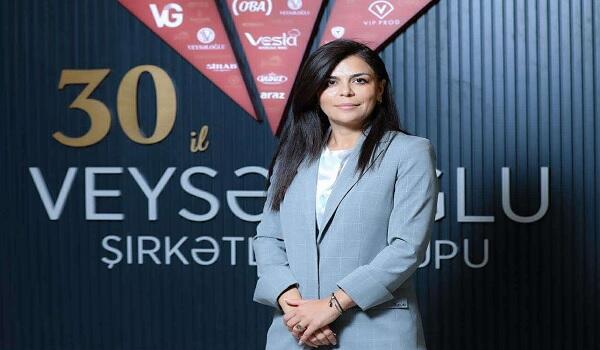As the Chief Finance Officer of Veysəloğlu Group of Companies, Konul Karimova has built her career at the intersection of leadership, strategy, and transformation. Beyond her business role, she speaks openly about the importance of women’s empowerment and inclusive leadership.
Axar.az reports that in this conversation, she shares how women contribute to business and society, the challenges that remain, and why true progress benefits everyone.
- What role do women play in driving business change today?
- Women today are not just present in business, they are actively shaping it. In leadership positions, women often bring qualities such as collaboration, empathy, and resilience. These qualities don’t replace others but add a broader perspective, which makes decision-making stronger and more balanced. When decisions are made this way, companies are better at innovating, managing risks, and adapting to change.
This is not just my observation — it’s something we see reflected globally. Studies from organizations like McKinsey and Credit Suisse have shown that companies with more diverse leadership teams, including women, often perform better and are more resilient in times of change. To me, that simply confirms what experience already tells us: when leadership reflects a wider range of perspectives, organizations become stronger and more competitive.
- How does women’s leadership go beyond business into society?
- The effect of women in leadership doesn’t stop at the company level; it flows into communities and society. Alongside their male colleagues, women often channel their influence into areas like education, healthcare, and family well-being. These choices create benefits that go far beyond profit margins.
Studies by institutions like the World Bank and UN Women have shown that women reinvest a larger share of their income into their families and communities — up to 90%, compared to around 30–40% for men. This doesn’t mean one approach is better, but it shows how women’s contribution adds an important dimension to social progress.
So, when women are empowered in leadership, the impact is felt not just in boardrooms but in classrooms, hospitals, and communities at large.
- What challenges still prevent women from reaching top leadership roles?
- The biggest barrier is not only organizational but also cultural. Many of these challenges come from traditional stereotypes about gender roles. And stereotypes, as we know, are rooted in everyday realities. The only way to truly break them is by gradually changing those realities.
Take child-raising as an example. If society continues to see raising children as only a woman’s responsibility, while men are expected only to earn money, then women will always face unequal terms. Even if she is treated fairly at work and offered leadership roles, she carries an extra burden at home — and that makes it harder to compete on equal footing.
This is just one example. The same imbalance appears in many other parts of family and social life, from caring for elderly parents to managing household responsibilities. These cultural patterns create an uneven playing field that no workplace policy alone can solve.
That’s why equality requires more than company initiatives. It takes broader change: sharing family responsibilities, shifting expectations, and encouraging men to take part in areas once seen as “women’s work.” Change is slow, but step by step, challenging these norms opens the way to true equality in leadership.
- What has been your own journey as a woman leader — and who inspired you along the way?
- My journey has always been about putting in extra effort — breaking stereotypes, proving myself, and not allowing limitations to define me. But it was also shaped by role models. Sometimes they were rare, but they mattered deeply.
One of my earliest memories goes back to childhood, long before I entered business. I dreamed of driving a car. I would watch my father closely every time he drove and imagine myself behind the wheel. But at that time, it was unusual for women to drive. Whenever I shared this dream, the men — and even the women — in my family and community would say, “women don’t drive.” Yet in our neighborhood there was one woman who did. And that single example gave me the confidence to hold on to my dream. Despite all the arguments against it, I made it happen
Today, this may seem like a simple story, especially when roads are full of women drivers. But for me, it was symbolic. It taught me early on that reality changes when you believe in yourself, stay true to your convictions, and draw strength from the examples of others. That lesson has been with me all my life: persistence, self-belief, and encouragement from role models —even if they were few— can help women overcome barriers and inspire change.
- What message would you like to give young women aspiring to leadership?
- Believe in the value of your voice. Leadership is not about being perfect, but about being authentic, courageous, and willing to take responsibility. Look for mentors, keep learning, and don’t shy away from challenges.
And as you move forward, remember to lift others with you. True leadership is not just about the position you hold, but about the impact you multiply. Every woman who takes a step forward opens doors for others, and that’s how real, collective change happens.
- Looking ahead, how do you see women shaping economies and societies?
- I believe the future will be defined by inclusive leadership, and women will be central to it. We’ve already seen enormous progress over the past decades — women entering industries once closed to them, leading businesses, influencing policy, and reshaping social norms. But this is only the beginning.
When women participate equally, economies grow faster and societies become stronger. Women bring perspectives that encourage innovation, collaboration, and long-term thinking — qualities that are essential to solving today’s complex challenges, from economic development to sustainability. Empowering women is not just a question of fairness; it’s one of the smartest investments any country or company can make.
Looking at global trends, we see that societies, nations, and businesses transform when education, knowledge, and intellectual capital grow. The more fully societies use their intellectual capital, the faster they progress. And that means doubling potential by engaging women in every part of the process.
At the end of the day, everything I’ve said applies not only to women, but to men as well. Believing in yourself, focusing on opportunities, and sharing responsibilities are principles that benefit everyone. When both women and men embrace this approach, the result is stronger businesses, healthier societies, and more prosperous nations.


















































